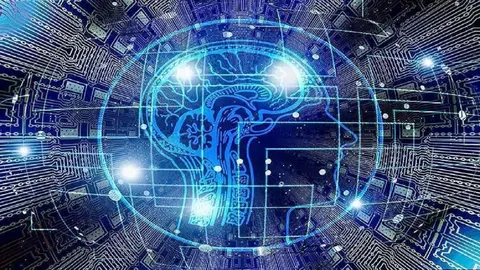Disinformation, cyber-attacks and climate threats: the main challenges of 2024

2023 will be remembered, among other things, for the strong emergence and development of artificial intelligence in various fields. Despite the numerous advantages and benefits of AI, this tool also entails numerous risks if it is not used correctly.
- The risks of AI in the 2024 election process
- Cybersecurity must be strengthened by 2024
- Extreme weather events, biodiversity loss and ecosystem collapse
As we have seen, AI has been used to create false images that contribute to misinformation, one of the main scourges of the 21st century that goes hand in hand with new technologies and social networks.
If 2023 was the year in which artificial intelligence made its triumphal entry, 2024 will be the year in which tools must be created to regulate and control it.
The European Union closed 2023 with an agreement on the first law to regulate AI. This measure taken by Brussels promotes the innovation of this tool in Europe while limiting the possible excesses of this technology.
Artificial intelligence is here to stay, and so are the challenges it brings. According to the World Economic Forum's (WEF) Global Risks Report 2024, AI-derived misinformation and its implications for social polarisation rank ahead of climate change, war and economic problems in the top 10 risks for the next two years.
The top 5 risks that are most likely to present a material crisis on a global scale in 2024.
— World Economic Forum (@wef) January 10, 2024
Read our Global Risks Report 2024, published with @MarshMcLennan and @Zurich, for more information:https://t.co/5N0VFeDkBG#wef24 #risks24 pic.twitter.com/abikCSw0Xm
The risks of AI in the 2024 election process
Artificial intelligence poses a major challenge in the run-up to 2024, when half of the population is called to the polls. More than 2 billion people in 70 countries are expected to vote this year, under the shadow of disinformation and fake news, both closely linked to AI.
The World Economic Forum says that the impact of this technology on elections around the world over the next two years will be significant, and fears that this could lead to the legitimacy of elected governments being questioned, which in turn could threaten democratic processes and increase social polarisation with riots and violence.
Today we release the @wef's Global Risks Report 2024, produced with @MarshMcLennan and @Zurich.
— World Economic Forum (@wef) January 10, 2024
Misinformation/disinformation is the biggest short-term risk, while the environment dominates longer-term concerns.
Read it here: https://t.co/5N0VFeDkBG #risks24 #wef24 pic.twitter.com/llLRlXCtM4
However, they do not doubt the great opportunities that AI brings, provided it is used in the right way. On this point, the WEF recalls the recent talks between US President Joe Biden and his Chinese counterpart Xi Jinping. Both acknowledged the risks associated with advanced artificial intelligence systems, a sign of growing international recognition of the need for responsible management.
"While not an immediate solution to geopolitical competition, the sustained dialogue lays the groundwork for greater cooperation and a possible reversal of digital fragmentation," says Benjamin Larsen, Leader, Artificial Intelligence and Machine Learning, World Economic Forum.
Larsen further warns that the integration of AI into conflict decisions poses "risks of unintended escalation and asymmetric empowerment of malicious actors".
.@zahidi, outlines a “pessimistic outlook” with risks progressively worsening over the next two to ten years.
— World Economic Forum (@wef) January 10, 2024
Read the @wef's Global Risks Report 2024 published with @MarshMcLennan and @Zurich to learn more:https://t.co/5N0VFeDSre#wef24 #risks24 pic.twitter.com/1p1esXgaLE
Cybersecurity must be strengthened by 2024
Another major challenge - linked to AI - that will need to be addressed during 2024 is cyber insecurity, according to the WEF. In particular, the organisation highlights cyber-attacks. "Trends in cybersecurity and cybercrime are driven by technological advances," explains Sean Doyle, leader of the World Economic Forum's Cybercrime Atlas Initiative.
According to Doyle, technological development is making the cyber equity gap more pronounced within and between countries. This makes everyone more vulnerable, even the best protected organisations.
On the other hand, Doyle warns that cyber attackers are adopting new technologies, such as generative AI tools to increase the number of markets they can target.

Extreme weather events, biodiversity loss and ecosystem collapse
In addition to AI, the other major protagonist of 2023 was extreme heat. Last year was the hottest year on record, with a global average temperature of 14.98 degrees Celsius, according to data from Copernicus, the European Union's Earth observation and monitoring program. 2023 broke another record, as its December was the warmest December on record globally.
Given this, as well as other extreme environmental phenomena experienced this past year, climate hazards is another major challenge of 2024 according to the WEF report.
🌍🌡️2023 is confirmed as the warmest calendar year on record, with a global average temperature of 14.98°C, 0.60°C above the 1991-2020 level, overtaking 2016, the previous warmest year.
— Copernicus ECMWF (@CopernicusECMWF) January 9, 2024
Learn more in the #C3S Global Climate Highlights report 👉 https://t.co/i7ZDNIrPvj pic.twitter.com/rwSzdfpclP
In addition to extreme weather events, the agency also highlights the loss of biodiversity and the collapse of ecosystems.
"Abrupt and irreversible changes in the Earth's systems lead to more extreme weather events and risk collapses in ecosystems that are not well adapted to new climates," says Gill Einhorn, Director of Innovation and Transformation, Center for Nature and Climate at the World Economic Forum.
As a solution to this major challenge that affects everyone, Einhorn cites "faster emissions reductions" as well as "credible action by all actors in our economic system to accelerate the speed and scale of a clean transition.

"Reducing human emissions is the quickest lever to postpone or avoid critical changes in earth systems," insists Einhorn, who also calls for "optimism" that we can respond to avoid and mitigate the worst risks.
"We are responsible for the possible sixth mass extinction, but we are also in a unique position to respond and avoid its worst consequences," he stresses.










